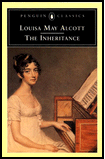The Inheritance
by Louisa May Alcott
- About Louisa May Alcott
- Questions for Discussion
- More Penguin Classics
- Buy this Book!
Enter promo code TEACH for 15% off.
INTRODUCTION
My first novel at seventeen
"I wonder if I shall ever be famous enough for people to care to read my story and struggles."
– Louisa May Alcott
Louisa May Alcott captivated the reading public during her lifetime and became one of the best-selling authors of the nineteenth century. Her novels, which drew so eloquently upon her own tragedies and triumphs, touched a chord with readers, earning her fame and fortune in her own day and a lasting legacy in the American literary canon. For all of us, then, the discovery of The Inheritance, Alcott's first known novel, is an unexpected and most welcome delight. It's a rare chance to explore the early work of this amazing writer.
In the archives of Harvard University, Joel Myerson and Daniel Shealy came across a handwritten manuscript in a red notebook bearing an inscription in Alcott's own hand: My first novel written at seventeen, High St., Boston. Why she never chose to publish The Inheritance is unknown, as her letters and diaries from this period have been destroyed. What is clear, however, is that The Inheritance is a forerunner to Alcott's later works, including her autobiographical novel Little Women. The Inheritance emphasizes themes that were important to her and that would appear throughout her work: honesty, integrity, and self-sacrifice. It also clearly conveys what may well be the most important of themes to Alcott: family. For Edith Adelon, the impoverished Italian orphan who forsakes a legacy of wealth in The Inheritance, being part of a family is her most fervent wish. After destroying evidence that would prove her noble birth, Edith says, "Now I am the poor orphan girl again. Take all that I can give, and in return for this act, let me call you mother and be a faithful, loving child, for you can never know how sad it is to be so young and yet so utterly alone." Jo March later echoes a similar sentiment in Little Women when she states, "I do think that families are the most beautiful things in all the world."
The Inheritance also focuses, as do many of Alcott's novels, on the intricate relationships among a family of women. There are struggles, heartaches, and misunderstandings. There are tears and laughter. Sometimes there is even jealousy and hostility, as is the case with Lady Ida Clare's feelings toward Edith. In the end, though, forgiveness triumphs, and the bond between this family of strong women is proven deep and unshakable. Reading Alcott's first novel, it's clear how important it was to her to explore and convey the relationships women share with one another.
For 150 years, Alcott has inspired women and men of all ages. Much of her writing was derived from her own life experiences, which is perhaps what endears her so passionately to her readers – because we catch a glimpse of her through her stories. The honesty and passion, vulnerability and strength that lace her novels ring with true feeling, and, like Simone de Beauvoir, Joyce Carol Oates, Cynthia Ozick, and many others who have attested to the power and influence of Alcott's novels, we see something of ourselves in her stories. With Jo in Little Women, Alcott created a personification of herself. And through the words of Jo, we catch a glimpse into Louisa May Alcott's soul and perhaps of her greatest desire: "I want to do something splendid – something heroic or wonderful that won't be forgotten after I'm dead. I think I shall write books." For Edith Adelon, The Inheritance holds far more meaning than monetary wealth; it's a legacy that makes her rich in ways that money never could – by giving her the family and the love she so desperately desires. And for us, The Inheritance is a priceless gift from a writer who will live forever through her extraordinary and endearing works.
ABOUT LOUISA MAY ALCOTTBorn on November 29, 1832, Louisa May Alcott centered her life around her close-knit family. The second of four daughters of Bronson and Abigail Alcott, Louisa's childhood was often turbulent. The family moved frequently to accommodate Bronson, a teacher and philosopher, and money was scarce. Yet their rich family life provided Alcott with much inspiration for her novels. Her father was instrumental in the Transcendentalist movement, and his friends included some of the most famous literary figures of the time, among them Henry David Thoreau and Ralph Waldo Emerson, both of whom proved to be influential in Alcott's life and on her writing.
Alcott, who worked as a seamstress, a teacher, and a lady's companion to help support her family, was a great proponent of women's rights and active in the feminist movement. She was the first woman to register in Concord, Massachusetts, in 1879, when the state granted women limited suffrage. Alcott began writing at an early age, and she published her first piece, a poem, in Peterson's Magazine in 1851 at the age of nineteen. Her first story, "The Rival Painters: A Tale of Rome," followed in 1852. Alcott published subsequent pieces, including her first book, Hospital Sketches, a nonfiction work based on her service as a nurse, and was eventually earning enough money through her writing to support her family. In 1868, Little Women was published and with it came wealth and fame. Alcott went on to pen many novels, including Little Men, Jo's Boys, and Work, stories which have made her one of the most beloved writers of all time. Louisa May Alcott died in Boston in 1888.












